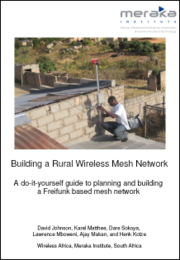DIY Mesh Guide: Difference between revisions
No edit summary |
No edit summary |
||
| Line 12: | Line 12: | ||
Reliable, affordable and easy access to telecommunication services for all has been identified as key to social and economic development in Africa. Self-provisioning and community ownership of low cost, distributed infrastructure is becoming a viable alternative to increase the penetration of telecommunication services in rural Africa. The recent emergence of wireless mesh network technology (based on IEEE 802.11 a/b/g standards) can help to improve the delivery of telecommunication services in these regions. | Reliable, affordable and easy access to telecommunication services for all has been identified as key to social and economic development in Africa. Self-provisioning and community ownership of low cost, distributed infrastructure is becoming a viable alternative to increase the penetration of telecommunication services in rural Africa. The recent emergence of wireless mesh network technology (based on IEEE 802.11 a/b/g standards) can help to improve the delivery of telecommunication services in these regions. | ||
Revision as of 16:21, 2 November 2007
Building a Rural Wireless Mesh Network
A do-it-yourself guide to planning and building a Freifunk based mesh network

About The Guide
Building a Rural Wireless Mesh Network
Reliable, affordable and easy access to telecommunication services for all has been identified as key to social and economic development in Africa. Self-provisioning and community ownership of low cost, distributed infrastructure is becoming a viable alternative to increase the penetration of telecommunication services in rural Africa. The recent emergence of wireless mesh network technology (based on IEEE 802.11 a/b/g standards) can help to improve the delivery of telecommunication services in these regions.
DIY Guide topics
Version 0.7_65 of the DIY guide covers the following topics:
- Chapter 1: Introduction
- Chapter 2: Description of a wireless mesh network
- Chapter 3: Important condsiderations
- Chapter 4: Required Hardware and software
- Chapter 5: Planning the wireless mesh network
- Chapter 6: Building the wireless mesh network
- Chapter 7: Services on the network
- Appendix A: Acronyms
- Appendix B: Configuration Steps
- Appendix C: Troubleshooting FAQ
- Appendix D: Wireless Regulations in Africa
- Appendix E: How to prepare a CAT5 LAN cable
- Appendix F: Resources
- Appendix G: Planning Sheet
Core Group
(Comment - need to put a two liner description of the team members)
David Johnson - aka "kingdavid" is a research leader in the Wireless Africa group at the Meraka Institute.
Karel Matthee -
Dare Sokoya - Dare is currently reading for his PhD.
Lawrence Mboweni -
Ajay Makan - Ajay's passion lies in the development and implementation of wireless networks in communities, with a specific foucus on health and education
Henk Kotze -
Download
You can download the latest version of the guide in .PDF format here
Feedback
Please send us your feedback, comments and corrections to diymeshguide[at]meraka.org.za. We would like to know how you have used the guide, whether the guide was useful in setting up your mesh network and what topics should be expanded on or covered in the guide.
Read what comments have been received
Resources from the guide
A list of all the resources used in the guide can be found here

This work is released under the Creative Commons Attribution-ShareAlike 2.5 license. For more details regarding your rights to use and redistribute this work, see http://creativecommons.org/licenses/by-sa/2.5/